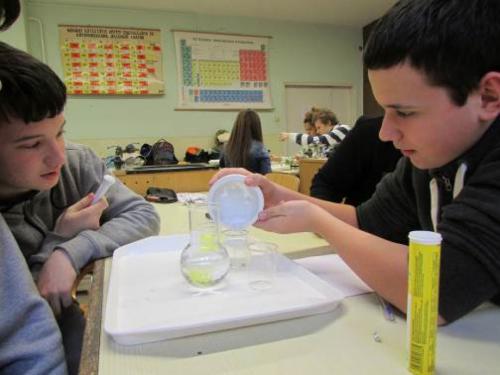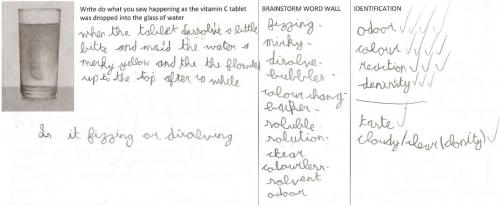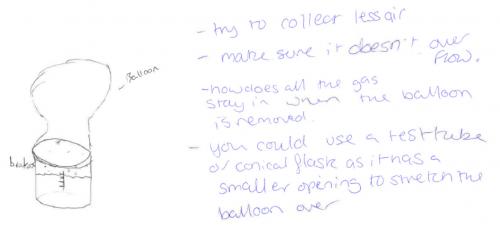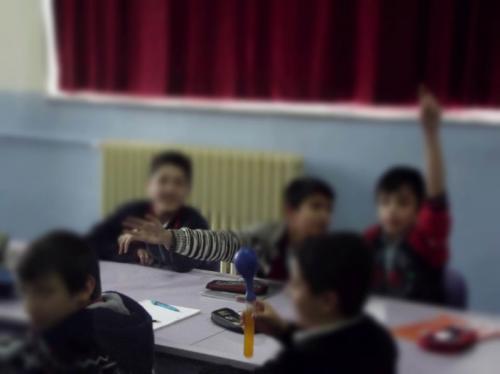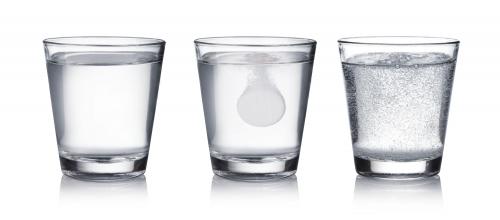The Reaction rates SAILS inquiry and assessment unit uses effervescent vitamin C tablets to introduce students to the concepts of gas production in the reaction of acid with carbonate, and rates of reaction and factors influencing reaction rate. Three activities aimed at lower second level are outlined, although they can be further extended and adapted for upper second level. The activities can be carried out in a sequence of lessons, which would require about ten class periods, or a specific activity can be targeted, requiring about two class periods depending on the skills to be assessed.
The first activity seeks to challenge students with collecting and identifying a gas, while the second activity explores quantitative measurements and graphical representation of data. The final activity explores identification of variables that may affect measurements. Students can develop a number of inquiry skills, in particular planning investigations and working collaboratively. They furthermore have the chance to progress their scientific reasoning capabilities and scientific literacy, through critiquing experimental design, interpreting and analysing data and graphical interpretation, and thus develop skills in forming coherent arguments.
This unit was trialled in Hungary, Ireland, UK, Turkey and Germany, with students aged 11-16 years (5 classes in total, mixed ability and gender). The teaching approach in all case studies was that of an open/guided inquiry. Inquiry skills assessed were planning investigations, and working collaboratively, as well as assessment of scientific reasoning (drawing conclusions). A broad range of assessment methods was used, ranging from in-class observation to evaluation of artefacts after the lessons, and including peer- and self-assessment.
- Rates of reaction
- Acid and carbonate reactions
- Factors influencing rates of reaction
- Properties of gases
- Lower
- Upper
- Planning investigations
- Forming coherent arguments
- Working collaboratively
- Scientific reasoning
- Scientific literacy
- Classroom dialogue
- Teacher observation
- Peer-assessment
- Self-assessment
- Worksheets
- Student devised materials
- Presentations
- Other assessment items
The teaching and learning activities described in the Reaction rates SAILS unit were developed for the SAILS project by the team at Dublin City University (DCU). There are three activities in this unit; each activity is described, with its rationale, suggested lesson sequence and some teacher questions. Proposed methods for assessment during this unit are included, which may be used by teacher/peers to make judgements on student performance. Activity A: Designing an investigation is a preliminary activity to challenge the students with collecting and identifying a gas. Activity B: Determining reaction rate explores quantitative measurements, and graphical representation of data. This introduction to quantitative measurement leads into Activity C: Altering reaction rates, in which students identify variables that may affect measurements.
When dealing with the unit activities, it is important that the assessment is in line with the objectives of the topic and with the curriculum. It is also important that students know before they commence their work how to report their results and how they will be judged. The draft unit proposed that planning investigations was a key inquiry skill for development during implementation, but opportunities for assessment of other skills and competencies have been identified for each of the unit activities. For each of the activities, some suggested skills for assessment and criteria for success are outlined.
The Reaction rates SAILS inquiry and assessment unit is suggested for implementation with lower second level students. However, a further activity is proposed for use with upper second level students, in which the rate of reaction between sodium carbonate and citric acid is investigated and compared to that between sodium carbonate and ascorbic acid. In addition, a post-unit assessment is proposed, which can be used to evaluate students’ understanding and ability to transfer knowledge.
Below you can find the full inquiry and assessment unit for download, as well as an archive with classroom materials, including student worksheets and assessment tools for teachers to be used during the activities if available.
Unit booklet Classroom materials| Concept focus |
Production and properties of CO2
Acid-carbonate reaction
|
| Inquiry skills focus |
Planning investigations
Working collaboratively
|
| Scientific reasoning |
Argumentation
|
| Scientific literacy |
Critiquing experimental design
|
| Assessment methods |
Classroom dialogue
Worksheets
Student devised materials
|
| Concept focus |
Acid-carbonate reaction
Distinguish between reacting and dissolving
Handling of gases
|
| Inquiry skills focus |
Planning investigations
|
| Scientific reasoning |
Proportional reasoning
|
| Assessment methods |
Student devised materials
|
| Concept focus |
Effect of variables
|
| Inquiry skills focus |
Forming coherent arguments
Working collaboratively
|
| Scientific literacy |
Presenting scientific conclusions
|
| Assessment methods |
Student devised materials
Presentations
|
This unit was trialled in five countries, producing five case studies of its implementation – CS1 Hungary, CS2 Ireland, CS3 United Kingdom, CS4 Turkey, CS5 Germany. All the case studies were implemented by teachers who had some experience of teaching through inquiry, but the students involved had generally not been taught through inquiry, except for CS3 United Kingdom and CS5 Germany.
CS2 Ireland, CS3 United Kingdom, CS4 Turkey and CS5 Germany detail implementation at lower second level, with students aged 11-15 years, and students were 15-16 years old in CS1 Hungary. The students in each class were mixed ability, and mixed gender in all case studies, except CS2 Ireland, where students were all boys. In CS5 Germany, the students were participating in an elective interdisciplinary science course. Generally the case studies describe an implementation duration of approximately 90 minutes (two 40-minute lesson periods or one double lesson); CS4 Turkey describes a single 40-minute lesson.
All case studies focused on assessing students’ skill in planning investigations. Some focus as well on evaluating their scientific reasoning capabilities and skill in working collaboratively, as well as other skills. Assessment was achieved through classroom dialogue, evaluation of students’ written materials and peer- and self-assessment.
The inquiry approach used in all the case studies was that of bounded inquiry, i.e. it was guided in the sense that the teacher posed the initial question but there were open inquiry opportunities in that students had freedom in addressing the question. In CS3 United Kingdom, the teacher implemented the initial part of the activity (designing an investigation) as a purely open inquiry.
The students in all the case studies worked in groups at various stages throughout the lessons, but there was variation in both how the groups were chosen and the group size.
Within the five case studies, the inquiry skills of planning investigations, forming coherent arguments and working collaboratively were assessed in different ways. Additionally content knowledge, evidence of scientific reasoning and scientific literacy were assessed. While the case studies highlighted the development of several inquiry skills, the assessment was only described for a few of these skills. For some skills, the assessment was carried out after class and was based on a written artefact produced in class. In other situations, formative assessment guided the student learning during the class.
Below you can find the full inquiry and assessment unit for download (excluding the case studies), as well as an archive containing all the case studies.
Unit booklet Case studies| Concept focus |
Determining rate of reaction – altering rate of reaction
|
| Activities implemented |
Determining reaction rate
Altering reaction rate
|
| Inquiry skills assessed |
Planning investigations
Forming coherent arguments
Working collaboratively
|
| Scientific reasoning |
Data entry
Drawing conclusions
|
| Scientific literacy |
Presenting scientific data
|
| Assessment methods |
Classroom dialogue
Teacher observation
Worksheets
Student devised materials
|
| Level |
Upper
|
| Age |
15-16
|
| Prior experience with inquiry |
No experience
|
| Concept focus |
Introduction to IBSE
Designing an investigation
Production and properties of CO2
|
| Activities implemented |
Designing an investigation
|
| Inquiry skills assessed |
Planning investigations
Working collaboratively
|
| Scientific literacy |
Critiquing experimental design
|
| Assessment methods |
Classroom dialogue
Teacher observation
Worksheets
Student devised materials
Other assessment items
|
| Level |
Lower
|
| Age |
14
|
| Prior experience with inquiry |
Some experience
|
| Concept focus |
Factors influencing rates of reaction
|
| Activities implemented |
Designing an investigation
Altering reaction rate
|
| Inquiry skills assessed |
Planning investigations
Working collaboratively
|
| Scientific reasoning |
Trouble-shooting
|
| Scientific literacy |
Critiquing experimental design
|
| Assessment methods |
Classroom dialogue
Teacher observation
Self-assessment
Student devised materials
|
| Level |
Lower
|
| Age |
11-12
|
| Prior experience with inquiry |
Some experience
|
| Concept focus |
Methods for collection of gases
|
| Activities implemented |
Designing an investigation
|
| Inquiry skills assessed |
Planning investigations
Forming coherent arguments
|
| Assessment methods |
Classroom dialogue
Student devised materials
|
| Level |
Lower
|
| Age |
12-13
|
| Prior experience with inquiry |
No experience
|
| Concept focus |
Determining rate of reaction – altering rate of reaction
Handling and identifying gases
|
| Activities implemented |
Designing an investigation
Determining reaction rate
Altering reaction rate
|
| Inquiry skills assessed |
Planning investigations
|
| Scientific reasoning |
Identifying variables
|
| Assessment methods |
Classroom dialogue
Teacher observation
Peer-assessment
Student devised materials
Presentations
|
| Level |
Lower
|
| Age |
14-15
|
| Prior experience with inquiry |
Some experience
|

